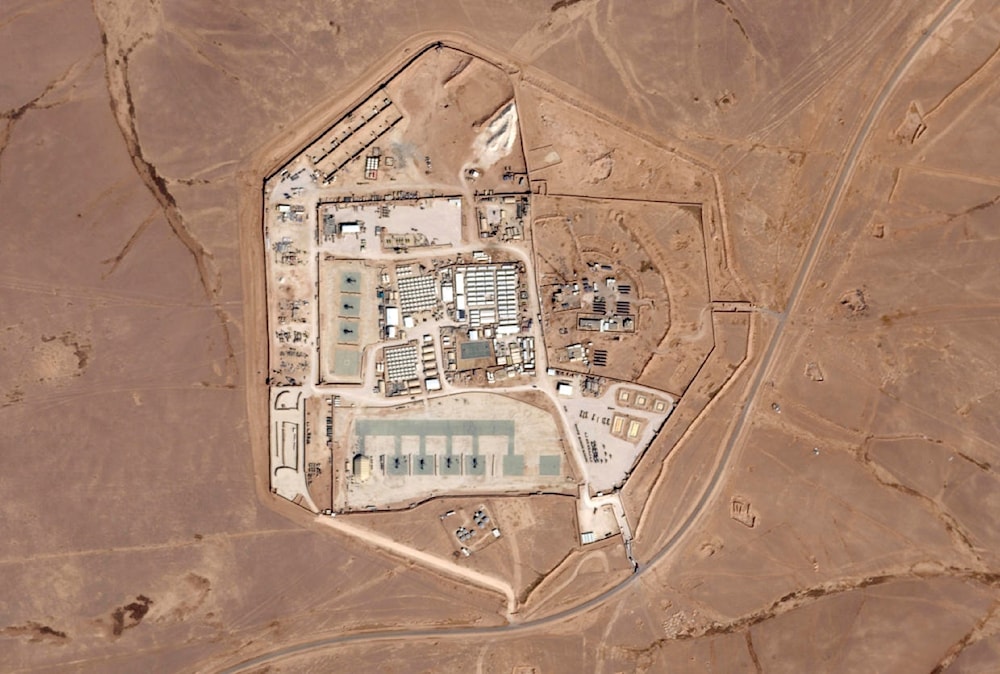US approves strikes on Iranian personnel and facilities in Iraq, Syria
US officials tell CBS News that the timing of the strikes would rely on the weather since they would like to have a clear sight of the targets.
-

A satellite photo shows the military base known as Tower 22 in northeastern Jordan on October 12, 2023, where a drone strike on January 28, 2024, killed 3 American troops. (AP)
US sources confirmed to CBS News that the US has approved a series of attacks against targets in Iraq and Syria, including Iranian troops and installations, over several days.
US President Joe Biden revealed on Tuesday that he had decided on how to respond to the recent drone strike that killed three American troops in Jordan as part of the ongoing operations against the US forces in the region for its complicity in the ongoing genocide in Gaza.
Addressing reporters at the White House, President Biden placed blame on Iran for allegedly supplying the weapons used in the first fatal attack on a US military base since the start of the Israeli aggression on Gaza on October 7.
Officials told CBS that the timing of the strikes would rely on the weather since they would like to have a clear sight of the targets.
On his part, US Defense Secretary Lloyd Austin held a speech in the Pentagon briefing room today, addressing the drone attack on US forces.
Expressing sorrow and outrage over the death of three US soldiers in the Jordan drone attack, Austin said the attack was carried out by the Axis of resistance, yet it was unclear, according to him, how much Iran knew about it. Still, he maintained that Iran trains and funds these groups.
In this context, he promised a multi-tiered response that goes on for a number of times.
Commenting on Kataib Hezbollah's statement of suspending their military operations, Austin said, "Actions are everything, and we will see what happens in the future."
Calling this period a "dangerous moment in the Middle East," the US Defense Secretary said, "We will continue to avoid wider conflict, but we will take necessary actions to defend ourselves."
This comes as no fresh attacks on US forces have taken place since the Iraqi Kataib Hezbollah suspended their operations so as to not go against the wishes of the Iraqi government.
Secretary-General Abu Hussein al-Hamidawi said on Tuesday that the Islamic Resistance "had taken the decision to support the people of Gaza without any intervention from foreign parties," stressing that they would continue to support Palestinians in ways the Iraqi Resistance faction see fit.
Just one week ago, the Iraqi Resistance announced that it had transited to the second phase of its operations in which it will work on enforcing a blockade on Mediterranean maritime routes to the Israeli-occupied ports in occupied Palestine, the Secretary General of the Kataib Sayyid al-Shuhada, Abu Alaa al-Walai, announced in a post on X.
The leader of Kataib Sayyid al-Shuhada, a faction that operates under the umbrella of the Islamic Resistance in Iraq, made the announcement following US strikes that targeted members of the Iraqi government's Popular Mobilization Forces (PMF).
US President Joe Biden has blamed "radical Iran-backed militant groups operating in Syria and Iraq," likely referring to the Islamic Resistance in Iraq, which announced earlier this month that it would escalate its attacks after the US conducted several raids in Iraq and assassinated a military official in central Baghdad.
Biden also reaffirmed that the US forces are now "still gathering the facts of this attack," stressing, "We will carry on their commitment to fight terrorism. And have no doubt -- we will hold all those responsible to account at a time and in a manner our choosing."
The US doesn't have the facts, but they're sure Iran is responsible for the attack that targeted the US forces in the Jordanian-Syrian border area.
— Al Mayadeen English (@MayadeenEnglish) January 30, 2024
Going from "we know that Iran is behind it" to "we know that Iran certainly plays a role with these groups [responsible]", the US… pic.twitter.com/AAC7ruS3k5
Meanwhile, Pentagon spokesperson Sabrina Singh blamed Iran for allegedly enabling groups attacking the United States in the Middle East, claiming that the latest attack carried the "footprints" of the Iraqi Kataib Hezbollah (Hezbollah Brigades).
"We don't seek war, but we will take action, and respond to attacks on our forces," Singh said.
Going from "we know that Iran is behind it" to "we know that Iran certainly plays a role with these groups [responsible]", the US Deputy Pentagon Press Secretary couldn't get any more contradictory.
"I don't have more to share in terms of an intelligence assessment on if leaders in Iran were directing this attack, but what I can tell you is that we know these groups are supported by Iran," which clearly underscores the insufficiency of evidence to definitively link Iran to the attack.
Although officials said the drone appeared to have been fired from Syria, Singh stated that the Central Command is still investigating the origin of the drone used in the attack.
When pressed for specifics, including whether it's the same type of Iranian drone used by the Russians in Ukraine or any evidence of who financed or directed the attack, Singh was at a loss for words. She only said, "We're assessing the drone" and that "Iran funds these [resistance] groups." This falls way short of establishing a standard of proof for Iran's alleged responsibility for the attack.

 5 Min Read
5 Min Read








